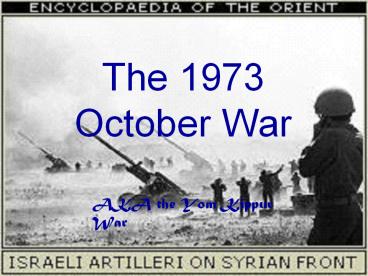The 1973 October War - PowerPoint PPT Presentation
Title:
The 1973 October War
Description:
Frustrated from surprise and the underestimated Arab frustration over Israeli occupation in Golan Heights ... 6 9) Second Battle of Mount Hermon ... – PowerPoint PPT presentation
Number of Views:581
Avg rating:3.0/5.0
Title: The 1973 October War
1
The 1973 October War
- AKA the Yom Kippur War
2
TIMELINE
- (10.06.1973) at 4am, Defense Minister Dayan was
informed that Egypt and Syria were going to
attack --at 2pm, Egypt and Syria attacked Israel
as a surprise attack. This perceived the Arabs
as weak and Egypt had just expelled its Soviet
military advisors. - (10.11.1973) Syrian forces were repelled.
- (10.18.1973) Israeli forces had crossed the Suez
Canal. - (10.20.1973) Kissinger flew to Moscow and
drafted a cease-fire agreement with Communist
Party. Chairman Leonid Breznev - (10.22.1973) The cease-fire was accepted by all
sides.
3
Where the war took place
4
Arab Points of Contention
- After being completely defeated by Israel in
1967, Arabs were unwilling to make peace. - There were 350,000-400,000 Palestinian refugees.
- March 1969, Egypt starts the War of Attrition
with Israel as a way to break the deadlock in
hopes of eventually reclaiming the Suez Canal. - Egypt received aid from the Soviet Union
weapons, technicians, and combat personnel. - Egypt was enduring many losses, eventually
accepted the US Secretary of State Rogers
Cease-fire proposal, but only if they pressured
Israel to accept Resolution 242 and leave those
occupied territories. War of Attrition ends
August 8, 1970. - Egypt sought a small military operation would be
beneficial to their poor economic and political
situation. - On October 6, 1973, Israel was attacked by Egypt
and Syria. Frustrated from surprise and the
underestimated Arab frustration over Israeli
occupation in Golan Heights, Sinai, West Bank,
and the Gaza Strip.
5
Israeli Points of Contention
- After Israels victory, Israel was not willing
to make a peace treaty. - With the war of attrition more than 1,000 Israeli
soldiers were killed. Israel responded with
bombardments on military and civilian targets
along the canal . - Israel now had gained control over more
Palestinian land, the population was 665,000
Palestinians and an additional 350,000-400,000
Palestinians became refugees. - During the beginning of 1973 , Israel felt
American support and military aid, the decline in
international pressure following the Munich
Olympic massacre. - Israel refused to withdraw to the pre-1967
armistice lines, they believed that its new
boundaries were vital for its national security.
With this act Israel and Egypt were not able to
form peace. - On October 6 1973, Israel was attacked by Egypt
and Syria. This was came as a surprise to
Israel, to the extent that Israel intelligence
had failed to predict the confrontation despite
evidence to the commentary.
6
Outcome of the Yom Kippur War
Consequences of the war were widespread. Nearly
8,500 Arab casualties were recorded with an
economic loss equaling to a whole years GNP. On
Israels side, some 6000 soldiers were killed and
had an equal economic loss like Arabs. The war
destroyed the image that Israeli forces are
invincible and it became more dependent on U.S.
for aids relating to economy, military and
diplomacy.
The war destroyed the image that Israeli forces
are invincible and it became more dependent on
U.S. for aids relating to economy, military and
diplomacy.
Israel withdrew back across the Suez Canal and
several miles inland from the east bank of the
Suez Canal behind an UN-supervised cease-fire
zone. On the Syrian front too, Israeli
territorial gains made in the war were given up.
After the war Egyptian and Syrian diplomatic
relations with the United States, broken since
the 1967 war, were resumed, and clearance of the
Suez Canal began. The Yom Kippur War brought
about a major shift of power in the Middle East
and ultimately led to the signing of the 1979
Israeli-Egyptian peace treaty.
Following the Yom Kippur War most of the African
states and some other Third World countries
emulated the earlier action of the Soviet block
and severed diplomatic relations with Israel.
7
Key Figures
- Syria
- Hafez al-Assad
- Egypt
- Anwar Sadat
- Ahmad Ismail Ali
- Israel
- Golda Meir
- Moshe Dayan
- David Elazar
- Avraham Adan
8
Other Key Figures
- Henry Kissinger (U.S.)
- Leonid Breznev (USSR)
- King Faisal (Saudi Arabia)
- Houari Boumediene (Algeria)
9
Key Battles
- Battle of Fort Lahtzanit (October 6)
- Battles of Fort Budapest (October 6, 1973)
- First Battle of Mount Hermon (October 6-7)
- Operation Badr (October 68)
- Valley of Tears (October 6 9)
- Second Battle of Mount Hermon (October 8)
- Air Battle of El Mansoura (October 14, 1973)
- Battle of the Chinese Farm (October 1517)
- Battle of Ismailia (October 1822)
- Third Battle of Mount Hermon (October 2122)
- Battle of Suez (October 2425)
10
CREDITS
- Made by Bridgette G, Corrina C, Daniel S,
Phillippe L, and Susan C - Used the Sources -The Arab-Israeli Conflict by
Kirsten E. Schulze http//www.palestinefacts.or
g/pf_1967to1991_ykwar_result.php - http//www.historylearningsite.co.uk/yom_kippur_w
ar_of_1973.htm

